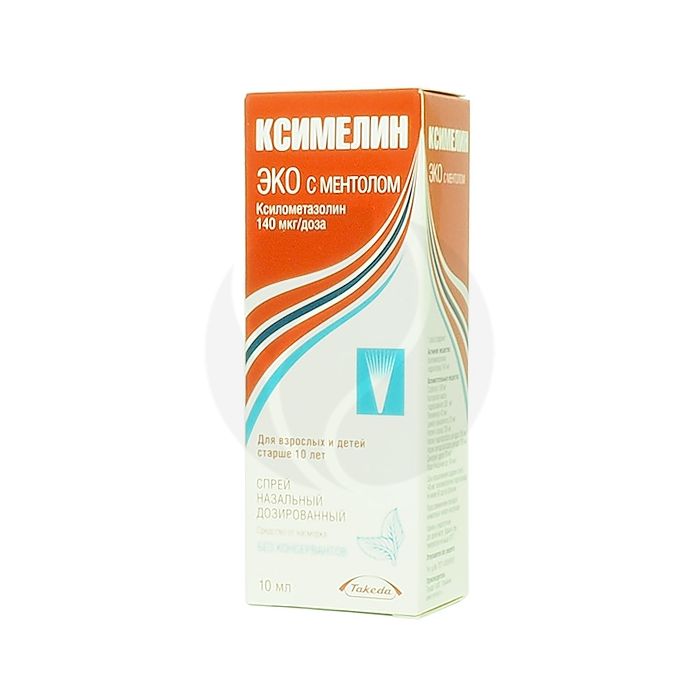Xymelin Eco spray with menthol 140mkg / dose, 10ml
Expiration Date: 05/2027
Russian Pharmacy name:
Ксимелин Эко спрей с ментолом 140мкг/доза, 10мл
acute respiratory diseases with symptoms of rhinitis (rhinitis);
acute allergic rhinitis;
hay fever;
sinusitis;
eustachitis;
otitis media (to reduce swelling of the nasopharyngeal mucosa); preparation of the patient for diagnostic manipulations in the nasal passages.
The drug is used intranasally. Adults and children over 10 years old - 1 injection into each nasal passage, if necessary, reapply the drug. The frequency of use is no more than 3 times / day. The duration of treatment is no more than 10 days.
Dosed nasal spray in the form of a clear or slightly opalescent, colorless or slightly colored liquid with a characteristic odor.
1 dose of xylometazoline hydrochloride 140 mcg
Excipients: sorbitol - 1.96 mg, hydrogenated castor oil - 350 mcg, levomenthol - 42 mcg, cineole (eucalyptol) - 28 mcg, sodium chloride - 728 mcg, sodium hydrogen phosphate dihydrate - 280 mcg, sodium dihydrogen phosphate dihydrate - 280 mcg, disodium edetate - 70 ?g, purified water - up to 140 ?l.
hypersensitivity to xylometazoline and other components of the drug;
arterial hypertension;
tachycardia;
severe atherosclerosis;
glaucoma;
dry rhinitis or atrophic rhinitis;
hyperthyroidism;
condition after transsphenoidal hypophysectomy;
surgical interventions on the meninges (in history);
pregnancy;
children under 10 years of age;
therapy with MAO inhibitors or tricyclic antidepressants, including a period of 14 days after their withdrawal.
With care: diabetes mellitus; pheochromocytoma; diseases of the cardiovascular system, incl. Ischemic heart disease, angina pectoris III-IV functional class; porphyria; breastfeeding period; hyperplasia of the prostate; atherosclerosis; with increased sensitivity to adrenergic drugs, accompanied by insomnia, dizziness, arrhythmia, tremor, increased blood pressure.
pharmachologic effect
Xylometazoline belongs to the group of local vasoconstrictor agents (decongestants) with alpha-adrenomimetic action, it causes narrowing of the blood vessels of the nasal mucosa, thus eliminating edema and hyperemia of the nasopharyngeal mucosa.
Xylometazoline also reduces concomitant mucus hypersecretion and facilitates drainage of blocked nasal passages and thus improves nasal breathing in case of nasal congestion.
In therapeutic doses, it does not irritate the mucous membrane, does not cause hyperemia. The effect occurs 2 minutes after application and lasts for 12 hours.
In vitro studies have shown that xylometazoline inhibits the infectious activity of the human rhinovirus that causes the 'common cold'.
Pharmacokinetics
When applied topically, it is practically not absorbed, plasma concentrations are so small that they cannot be determined by modern analytical methods.
Side effect
Classification of the frequency of occurrence of adverse reactions: very often (? 1/10); often (? 1/100, <1/10); infrequently (? 1/1000, <1/100); rarely (? 1/10 000, <1/1000); very rare (<1/10 000).
From the immune system: very rarely - hypersensitivity reactions (angioedema, rash, itching).
From the nervous system: often - headache; rarely - insomnia, depression (with prolonged use in high doses); very rarely - hallucinations and convulsions (mainly in children).
From the side of the organ of vision: very rarely - a violation of the clarity of visual perception.
From the side of the cardiovascular system: rarely - a feeling of palpitations, increased blood pressure; very rarely - tachycardia, arrhythmia.
From the respiratory system: often - irritation and / or dryness of the nasal mucosa, burning, tingling, sneezing, hypersecretion of the nasopharyngeal mucosa; rarely - nosebleeds.
From the digestive system: often - nausea; rarely - vomiting.
General disorders and disorders at the injection site: often - burning sensation at the site of application.
If any of the side effects indicated in the instructions are aggravated or other side effects not indicated in the instructions are noted, the patient must inform the doctor about it.
Application during pregnancy and lactation
The use of the drug is contraindicated in pregnancy.
During the period of breastfeeding, the drug should be used only after a careful assessment of the balance of benefits and risks for the mother and the child, under the supervision of a physician. Do not exceed the recommended dose.
Application in children
Contraindicated in children under 10 years of age.
special instructions
Do not use the drug for a long time (more than 10 days).
Long-term (more than 10 days) or excessive use of the drug can cause a 'rebound' effect (rhinitis medicamentosa) and / or atrophy of the nasal mucosa.
The recommended doses should not be exceeded, especially in children and the elderly.
If the symptoms of the disease worsen or the patient's condition does not improve within 3 days of using the drug, you should consult your doctor.
Overdose
Symptoms: xylometazoline, when administered locally in an excessive dose or if taken accidentally, can cause severe dizziness, increased and uneven pulse, increased sweating, a sharp drop in body temperature, headache, drowsiness, bradycardia, increased blood pressure, respiratory depression, coma and convulsions. Following an increase in blood pressure, a sharp decrease can be observed.
Treatment: Appropriate supportive measures should be taken for any suspected overdose. In some cases, immediate symptomatic treatment is indicated under the supervision of a physician. These measures should include monitoring the patient for several hours. In the case of severe poisoning with cardiac arrest, resuscitation should be continued for at least 1 hour.
Drug interactions
The use of xylometazoline is contraindicated in patients receiving MAO inhibitors or tricyclic antidepressants, including a period of 14 days after their withdrawal.
The simultaneous use of tri- or tetracyclic antidepressants and sympathomimetics can lead to an increase in the sympathomimetic effect of xylometazoline, so this combination is recommended to be avoided.

